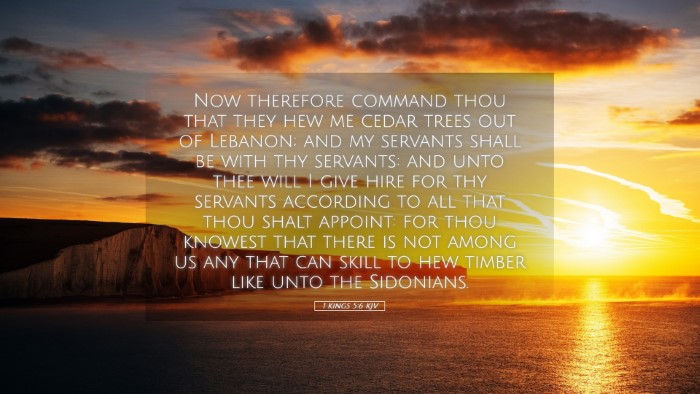Old Testament
Genesis Exodus Leviticus Numbers Deuteronomy Joshua Judges Ruth 1 Samuel 2 Samuel 1 Kings 2 Kings 1 Chronicles 2 Chronicles Ezra Nehemiah Esther Job Psalms Proverbs Ecclesiastes Song of Solomon Isaiah Jeremiah Lamentations Ezekiel Daniel Hosea Joel Amos Obadiah Jonah Micah Nahum Habakkuk Zephaniah Haggai Zechariah Malachi1 Kings 5:6
1 Kings 5:6 KJV
Now therefore command thou that they hew me cedar trees out of Lebanon; and my servants shall be with thy servants: and unto thee will I give hire for thy servants according to all that thou shalt appoint: for thou knowest that there is not among us any that can skill to hew timber like unto the Sidonians.
1 Kings 5:6 Bible Commentary
Commentary on 1 Kings 5:6
Verse: "Now therefore command thou that they hew me cedar trees out of Lebanon; and my servants shall be with thy servants: and unto thee will I give hire for thy servants according to all that thou shalt appoint: for thou knowest that there is not among us any that can skill to hew timber like unto the Sidonians."
Introduction
This verse is pivotal in the context of Solomon's preparations for building the Temple in Jerusalem. It reflects the relationships between kingdoms and the logistics involved in such an ambitious project. Solomon’s request to Hiram, king of Tyre, for cedar wood demonstrates not only Solomon's vision but also the importance of cooperation in fulfilling divine purposes.
Contextual Background
The historical and geographical context of 1 Kings 5:6 is essential for understanding the significance of Solomon’s request. Tyre, a powerful Phoenician city, was renowned for its skilled craftsmen and abundant resources. Cedar from Lebanon was prized for its quality, durability, and resistance to decay, making it the ideal material for sacred structures.
Commentary Insights
Solomon's Command to Hiram
Matthew Henry emphasizes the significance of Solomon's proactive approach in building the Temple. By reaching out to Hiram, he exemplifies wisdom in seeking assistance from those with the necessary expertise. Solomon understood the magnitude of the task ahead and recognized that collaboration was essential for success.
Albert Barnes notes that Solomon’s ability to request help indicates his recognition of the limitations within his own kingdom. He acknowledges the specific skillset of the Sidonians, highlighting the collaborative spirit that transcends national boundaries for the sake of a noble endeavor.
Adam Clarke provides insight into the cultural exchanges between Israel and Tyre. He suggests that this partnership not only involved the procurement of materials but also reflected a diplomacy that strengthened ties between the two nations. This cooperative relationship is indicative of God's providence in bringing together diverse resources for His work.
Theological Implications
The request for cedar trees signifies more than a mere logistical need; it represents the importance of beauty and quality in the worship of God. A dwelling place for God should reflect His glory, and the materials chosen for the Temple were to be the best available:
- The Aspiration for Excellence: Solomon’s choice of cedar reflects an aspiration for excellence in worship. The best materials are fitting for the house of the Lord, setting a precedent for believers to honor God with their best.
- Unity in Purpose: The collaboration between Solomon and Hiram illustrates the unity of purpose that can arise when nations and people work together for a common goal, particularly in service to God.
- Divine Providence: The ability to procure such magnificent materials through a cooperative effort underscores God’s hand in human affairs. God orchestrates circumstances to fulfill His divine purposes, as seen through Solomon's access to Hiram's resources.
Lessons for Modern Application
The lessons gleaned from 1 Kings 5:6 continue to bear relevance for contemporary believers, especially pastors and leaders:
- Seek Collaboration: Just as Solomon sought the expertise of the Sidonians, modern leaders should seek partnerships that enhance their ministry. Recognizing our own limitations can lead to fruitful collaborations.
- Aim for Quality: In all endeavors, especially in ministry, the pursuit of excellence should be paramount. Whether in worship, teaching, or service, offering our best to God is essential.
- Recognize God's Provision: Understanding that every resource comes from God can transform our perspective on material blessings and partnerships. Acknowledging God's providence in our work encourages gratitude and humility.
Conclusion
1 Kings 5:6 serves as a profound reminder of the collaboration required in fulfilling God’s plans. Solomon’s request was rooted in wisdom, practical need, and an aspiration for excellence in worship, all of which are crucial for effective ministry today. By examining such texts and their commentaries, we can draw insights that not only enrich our understanding of Scripture but also inform our practices as we work toward the common goal of glorifying God.


